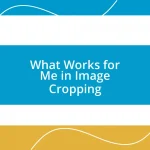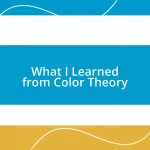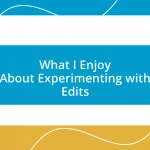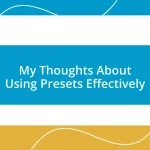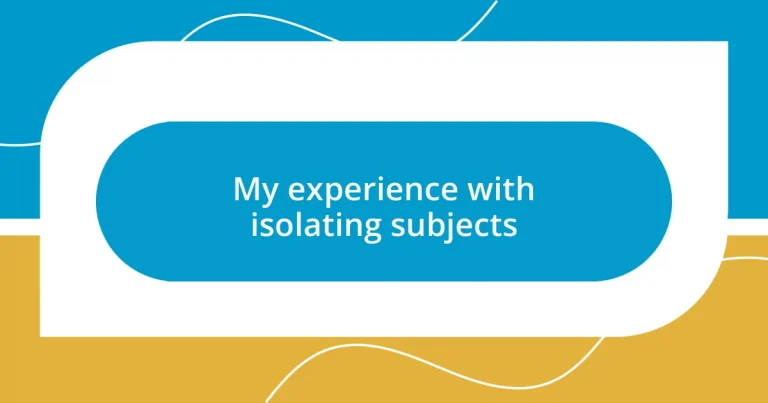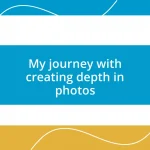Key takeaways:
- Isolating subjects enhances understanding and creativity by breaking down complex topics into manageable parts, facilitating deeper insights.
- Effective tools for isolating subjects, such as mind mapping and concept mapping, can improve focus and retention in learning processes.
- Discussing isolated subjects with others reinforces understanding and highlights knowledge gaps, while maintaining motivation is essential to overcoming challenges in the isolation process.
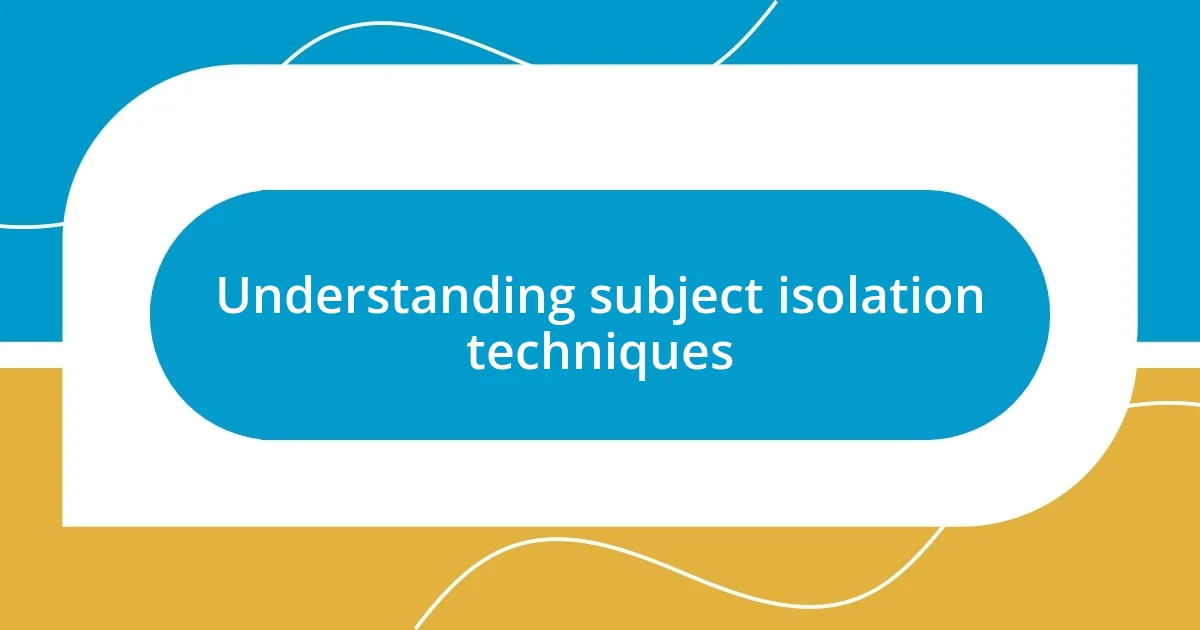
Understanding subject isolation techniques
When I first started exploring subject isolation techniques, I was struck by how pivotal they can be in research and learning. I remember sitting in front of a dense academic paper, feeling overwhelmed by the sheer volume of information. It dawned on me that breaking down subjects into smaller, manageable parts made the process not just easier but also more engaging. Have you ever felt that freeing moment when a complex topic suddenly becomes clear?
Diving into isolation techniques like concept mapping or clustering transformed my understanding. I once created a visual map of my thoughts on a substantial subject, and witnessing the connections between ideas illuminated a path forward in my studies. The act of isolating components not only clarified my thinking but also sparked creativity in how I approached the material. Isn’t it fascinating how we can unlock deeper insights just by rearranging our perspective?
Moreover, I’ve found that employing field-specific isolation methods can greatly enhance mastery. For instance, in my experience with scientific research, isolating variables significantly improved my experimental design. It’s like having a flashlight in a dark room; suddenly, the details become visible, and you can navigate with purpose. When was the last time you felt that rush of clarity from narrowing the focus on a single idea?
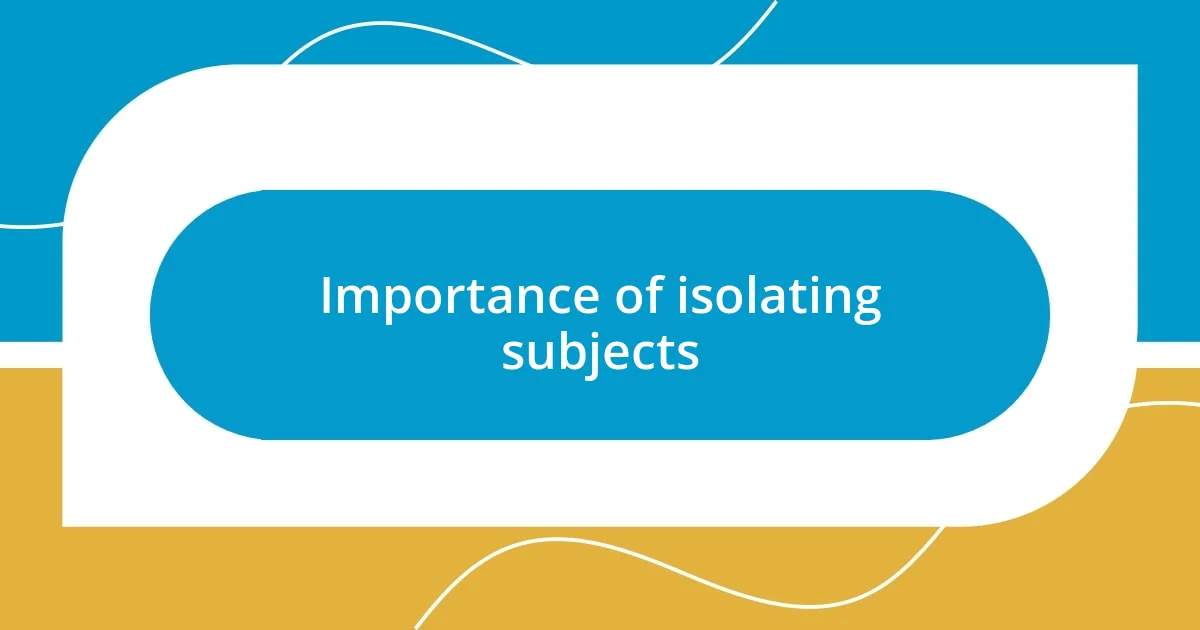
Importance of isolating subjects
Isolating subjects is vital because it refines our focus and aids in tackling complex ideas without feeling overwhelmed. I recall a study group where we attempted to dissect a dense textbook chapter. By isolating key themes and discussing them one by one, we found ourselves not only understanding the material better but also supporting one another’s learning journeys. This act of focusing on specific subjects can turn daunting tasks into manageable discussions, inviting collaboration and deeper insights.
From my experience, isolating subjects is also key to personal growth. I remember when I decided to focus on improving my writing skills. Instead of trying to tackle everything at once, I isolated different elements, such as grammar, style, and structure. It felt liberating to concentrate on one aspect at a time, leading to noticeable improvements and increased confidence. Have you ever focused on a specific habit? Isn’t it rewarding to see genuine progress through this targeted approach?
Ultimately, learning to isolate subjects can revolutionize how we interact with information. In my case, using techniques like journaling to explore thoughts around a single theme has deepened my understanding. Keeping it focused allowed me to engage in reflective thinking, leading to more profound insights than I had anticipated. When I look back, it often surprises me how such a simple strategy can create rippling effects in our comprehension and creativity.
| Key Aspect | Benefits |
|---|---|
| Refined Focus | Increased Engagement |
| Personal Growth | Targeted Skill Improvement |
| Deepened Understanding | Enhanced Reflective Thinking |
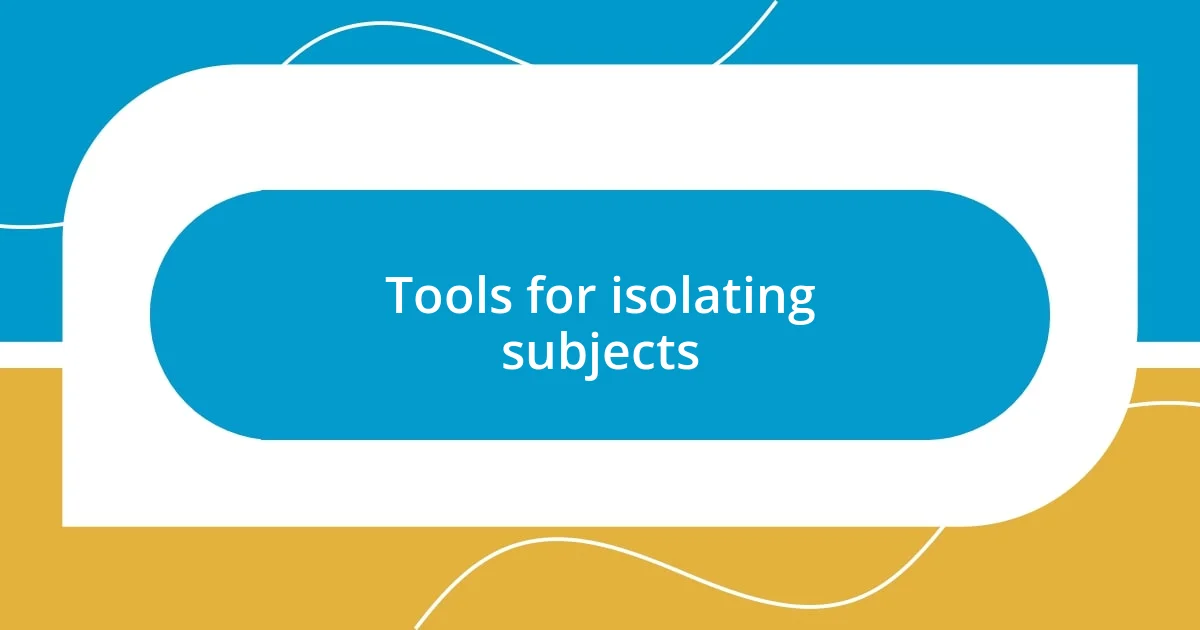
Tools for isolating subjects
When it comes to tools for isolating subjects, I’ve found that several techniques truly stand out. For instance, using digital mind mapping software has allowed me to visually untangle complex ideas. I remember the first time I tried a mind map; I felt a wave of relief as connections emerged and previously tangled thoughts became distinct and organized. It’s like a breath of fresh air for my brain.
Here are some effective tools that have worked for me:
- Mind Mapping Software (like XMind or MindMeister): These programs let you create visual representations of ideas, helping you see relationships clearly.
- Note-Taking Apps (such as Evernote or OneNote): They enable you to organize information into categories, making it simpler to focus on smaller sections of a larger topic.
- Flashcards (like Anki or Quizlet): By isolating individual facts or concepts, I find that my retention improves significantly.
- Concept Mapping: This technique allows for a graphical way to display relationships between concepts, which can facilitate deeper thinking.
The beauty of these tools lies in their ability to tailor the learning process to our needs. There was a time when I struggled with understanding a particular concept in a technical subject. I turned to flashcard apps to create succinct notes that defined terms and illustrated relationships. The satisfaction I felt when I could finally explain the concept to a friend was priceless. It’s those little victories that keep me motivated and engaged in my learning journey.
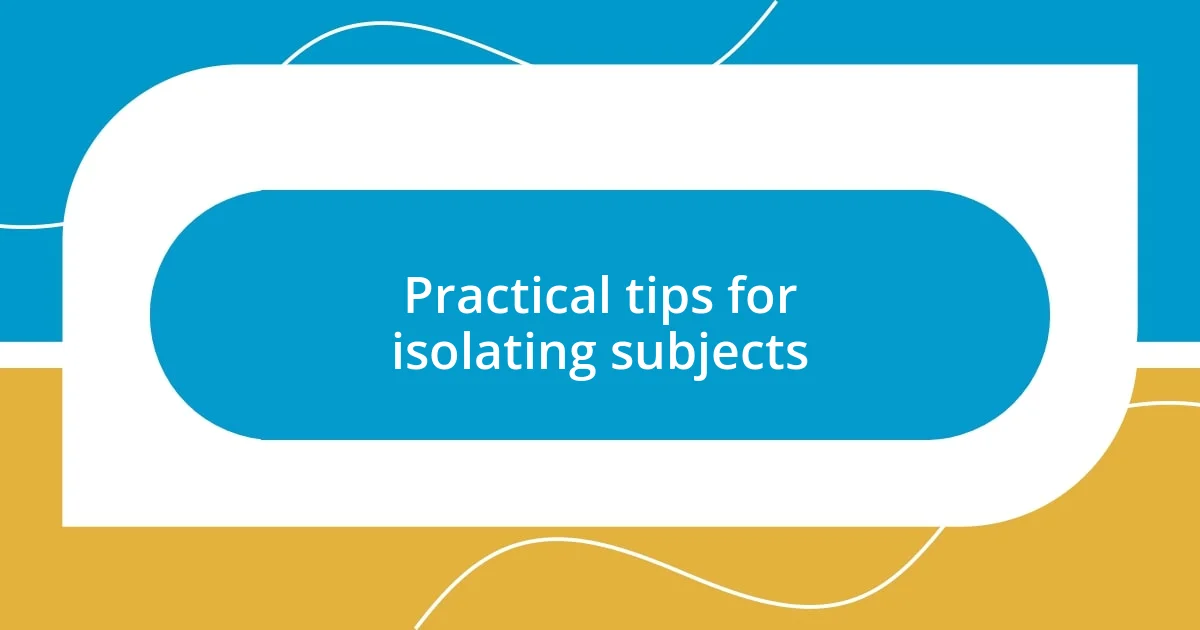
Practical tips for isolating subjects
To effectively isolate subjects, I always recommend starting with a clear goal in mind. For instance, I once needed to write an academic paper, and instead of diving straight into the writing, I defined the main argument I wanted to make. By breaking it down into sub-arguments, I found clarity in what needed focus. Have you ever tried to tackle a big project without a clear outline? It can feel like wandering through a maze without a map, right?
Another tip I’ve discovered is the power of timed sessions. During my study periods, I often set a timer for 25 minutes to concentrate on one specific topic or section. This technique, known as the Pomodoro Technique, worked wonders for my productivity. The added pressure of time helped me stay committed and made the task feel less daunting. Are you familiar with this method? It’s amazing how those short bursts of intense focus can lead to significant progress.
Lastly, I can’t stress enough how helpful it is to discuss isolated subjects with someone else. I recall a late-night coffee chat with a friend, where we each picked a theme and taught it to one another. This approach not only reinforced my understanding but also showcased gaps in my knowledge. It’s fascinating how verbalizing thoughts can solidify learning, don’t you think? Engaging with another person creates a different layer of insight that solitary study often lacks.
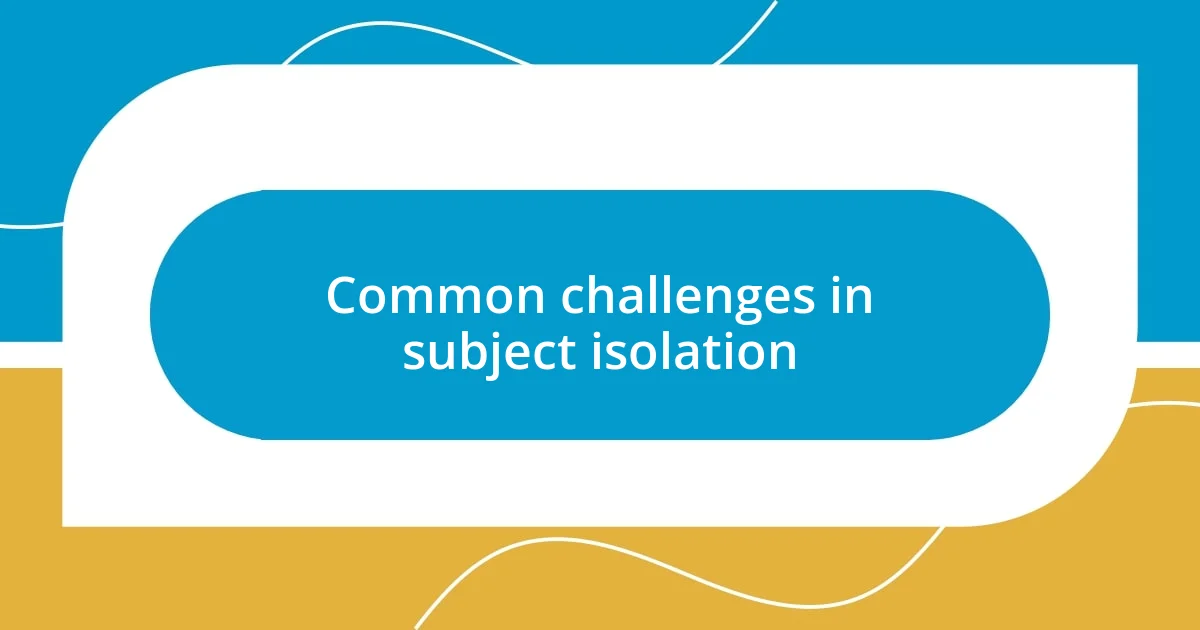
Common challenges in subject isolation
Isolating subjects can feel overwhelming at times, especially when you’re faced with a plethora of information. I remember grappling with complex theories in my studies; it was challenging not to get lost in the details. This confusion often leads to frustration, making it hard to focus on what truly matters. Ever experienced that sensation of drowning in a sea of data?
Another challenge I’ve encountered is the temptation to stray from the isolated subject due to the allure of related but tangential topics. I once found myself deep into research about one element of a project, only to discover it spiraled into an entirely different field. That diversion not only wasted valuable time but also muddied the clarity I had initially gained. Have you ever found yourself chasing side topics instead of sticking to the main thread? It can easily happen to anyone.
Lastly, maintaining motivation while isolating subjects can sometimes be a battle. I vividly recall a period where my enthusiasm waned as I dissected a particularly dense piece of literature. The excitement I had initially felt turned into monotony, and I had to actively remind myself of the end goal. How do you keep yourself energized during such tedious tasks? For me, it was all about incorporating small rewards, like a favorite snack or a quick walk, to break the monotony and refresh my mind. Finding ways to reignite that spark is crucial for progress.
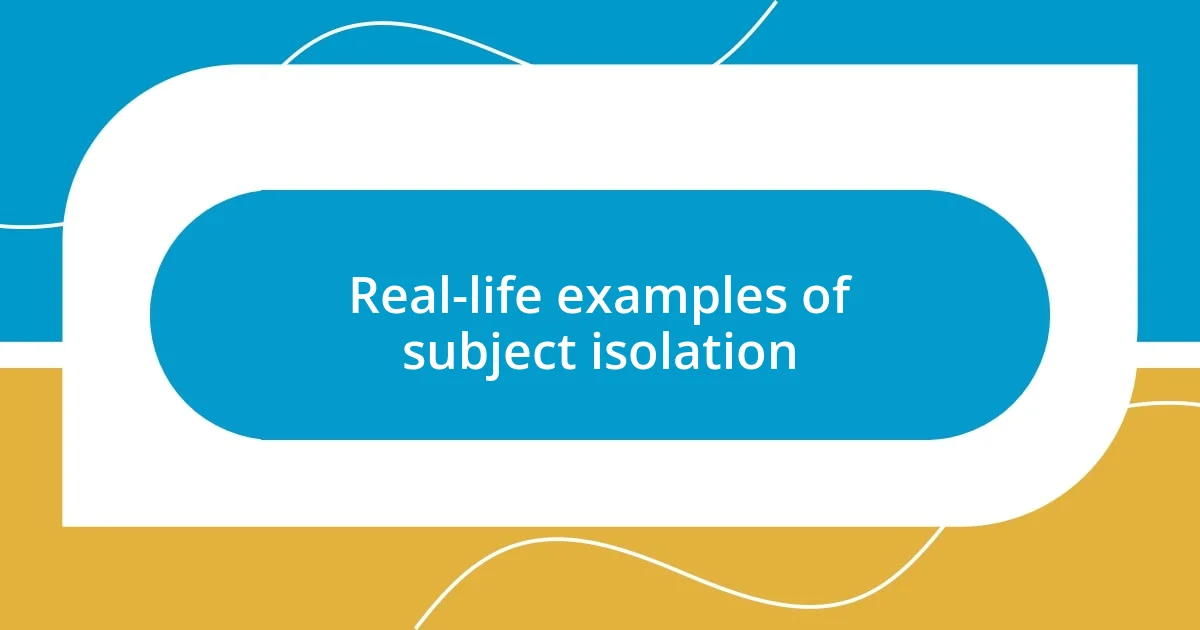
Real-life examples of subject isolation
One of the most striking examples of subject isolation in my life came during a group project in college. We were tasked with presenting a historical event, but as the different members of our group began to converge on their topics, I realized that focusing on one specific angle—not just the general history—elevated our presentation tremendously. I chose to narrow in on the economic impact of the event, allowing my research to go deep instead of wide. Have you ever had to sift through a mountain of information just to find that one golden nugget?
Another vivid instance was while preparing for an important exam. Instead of studying the entire curriculum, I identified my weak points and decided to isolate those subjects. I set specific days to tackle each topic, working through practice questions until they felt second nature. There’s something empowering about defining your own study boundaries to conquer what once seemed intimidating. Don’t you think it’s amazing how focusing on the right details can turn perceived weaknesses into strengths?
A more recent experience involves my love for photography. Recently, I attempted to focus solely on portrait photography for a month. I immersed myself in this particular subject by exploring lighting techniques and experimenting with angles. It felt like peeling back layers to reveal the essence of each individual I shot. That deep engagement was incredibly enriching. Have you ever dedicated time to mastering just one aspect of a hobby? There’s a unique thrill in honing your skills to such precision that it transforms your overall art form.
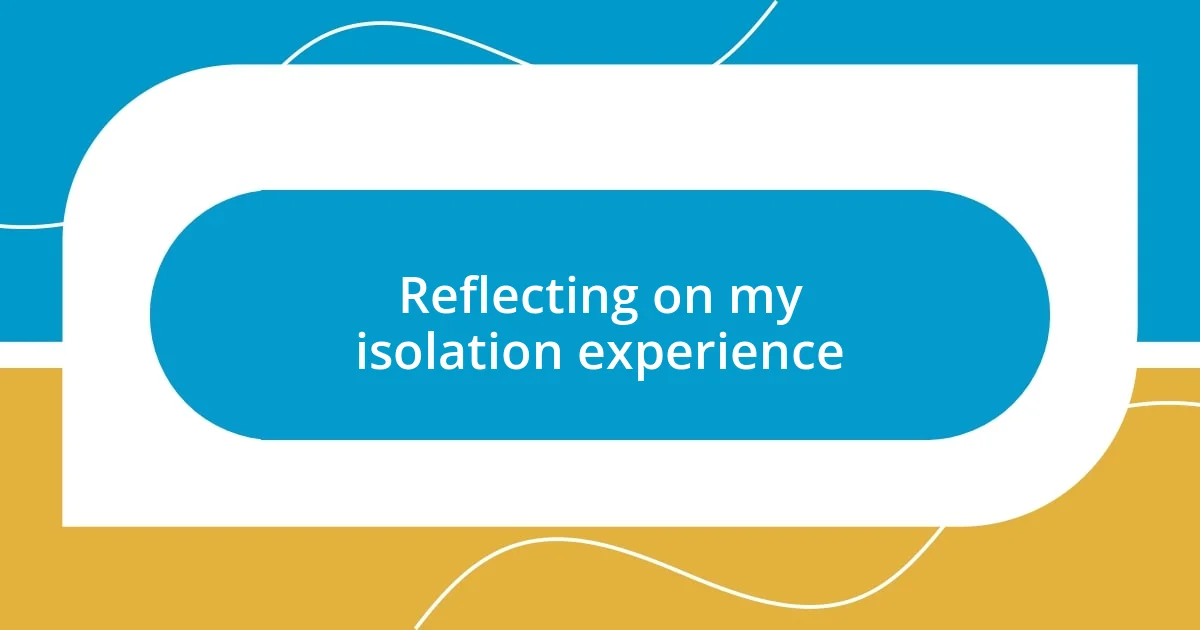
Reflecting on my isolation experience
Reflecting on my isolation experience, I recall a time when I decided to delve deeply into the psychology of color in design. I isolated that specific aspect for several weeks, reading everything from scholarly articles to practical guides. The process was enlightening, yet it came with a sense of loneliness, as the deeper I dove, the more distanced I felt from other design elements that initially inspired me. Have you ever immersed yourself so fully in a subject that the outside world seemed distant?
There was also a point where I had to confront the emotional toll of isolating subjects. As I focused on a single research paper, I often found myself tangled in self-doubt. The pressure to produce something noteworthy made me question my purpose repeatedly. I vividly remember a night where frustration turned to clarity as I embraced the struggle, realizing that even the journey of learning can be enlightening. Isn’t it fascinating how our toughest moments can lead to profound insights about ourselves?
Ultimately, my isolation experience became a double-edged sword—a means of gaining expertise while occasionally feeling disconnected. It reminds me of a time I tried yoga to center myself amidst my study. Each session provided not just relaxation, but also a newfound perspective on balance—an invaluable lesson. How do you find your equilibrium between studying deeply and engaging with the world around you? For me, the answer lies in scheduling brief breaks to reconnect with friends or even taking a deep breath outdoors, which recharges my passion for learning.

